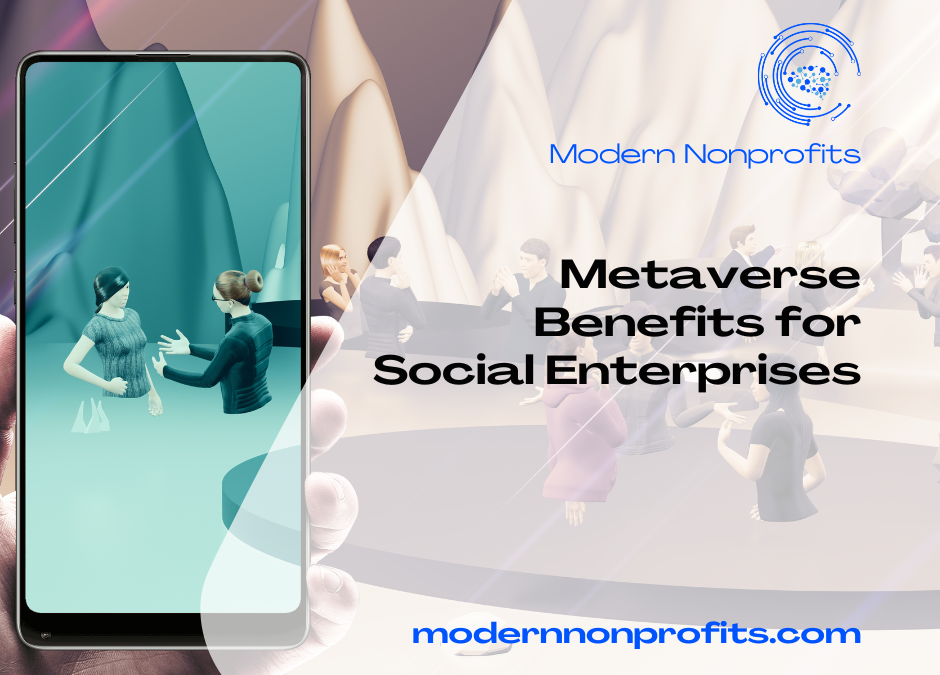Metaverse, a virtual world where people can interact in a highly immersive and interactive digital environment, has been gaining popularity in recent years. The potential of metaverse to transform various industries and bring new business opportunities is immense. Social enterprises can also leverage metaverse to achieve their social and environmental impact goals while creating financial value.
- New revenue streams: Social enterprises can generate revenue from virtual sales, events, advertisements, and sponsorships in metaverse. They can also offer unique experiences and products that cater to the metaverse audience, such as virtual tours of sustainable communities or eco-friendly products.

- Increased brand visibility and engagement: Metaverse offers a platform for social enterprises to engage with a wider audience and build their brand. They can create virtual spaces where customers can interact with the products, learn about the cause, and make purchases. This increases brand awareness and helps to create a loyal customer base.
- Collaboration and partnerships: Metaverse provides an opportunity for social enterprises to collaborate and partner with other organizations, businesses, and individuals to achieve common goals. For instance, a social enterprise focused on promoting sustainable tourism could partner with a metaverse platform to create virtual tours of sustainable communities and eco-friendly destinations.
- Improved customer experience: Metaverse offers a highly immersive and interactive experience for customers, which can improve customer satisfaction and engagement. Social enterprises can use this to create an emotional connection with their customers and build stronger relationships.
- Access to new markets: Metaverse offers a new market for social enterprises to sell their products and services. It allows them to reach customers who may not have been accessible through traditional channels.

In conclusion, social enterprises have a unique opportunity to leverage the potential of metaverse to achieve their social impact goals while creating financial value. By creating virtual spaces, generating new revenue streams, improving customer experience, and reaching new markets, social enterprises can build a sustainable future.
Further reading recommendation:
 Step into the Metaverse: How the Immersive Internet Will Unlock a Trillion-Dollar Social Economy by Mark van Rijmenam
Step into the Metaverse: How the Immersive Internet Will Unlock a Trillion-Dollar Social Economy by Mark van Rijmenam
“Step into the Metaverse: How the Immersive Internet Will Unlock a Trillion-Dollar Social Economy” by Mark van Rijmenam by Mark van Rijmenam is an insightful book that explores the potential of the metaverse as a new frontier for social and economic interaction. The author provides a clear and accessible overview of the concept of the metaverse, as well as the various technologies that are making it possible. Rijmenam also discusses the potential applications of the metaverse, from gaming and entertainment to education and commerce, and provides numerous real-world examples to illustrate his points. Overall, “Step into the Metaverse” is a recommended read for anyone interested in the future of technology and its impact on society and the economy.
 The Metaverse: And How It Will Revolutionize Everything by Matthew Ball
The Metaverse: And How It Will Revolutionize Everything by Matthew Ball
“The Metaverse: And How It Will Revolutionize Everything” by Matthew Ball is a highly informative and thought-provoking book that explores the potential of the metaverse to transform our daily lives in unprecedented ways. The author provides a clear and concise definition of the metaverse and explains its underlying technologies. He also examines its potential impact on various industries, such as entertainment, gaming, and e-commerce, and discusses the various challenges that must be addressed for the metaverse to be successful. Overall, “The Metaverse” is an excellent read for anyone interested in the future of technology and the potential for new forms of human interaction and economic growth.


